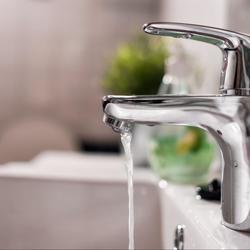Is Faucet Water Safe to Drink?
Are you worried about your home's water quality? While faucet water is typically safe to drink, it may contain contaminants that affect taste and long-term health. As a result, more homeowners are choosing to upgrade their filtration systems. In this guide, we'll look at:
With high-quality water filtration, you'll enjoy safer, cleaner, and tastier water.
Worried About Your Tap Water? Schedule a Water Quality Test With Advantage Air
For over 30 years, Advantage Air has supported Arizona locals with dependable plumbing services. No matter what the project is, you can expect fast scheduling, transparent pricing, and a 100% satisfaction guarantee.
Is Faucet Water Safe to Drink in Arizona?
Arizona's water supply must meet federal and state regulations that help ensure water safety. These include Environmental Protection Agency (EPA) standards, which establish maximum contaminant levels that the water supply can contain. That being said, water quality can still vary based on:
- Water source. Surface water sources (such as rivers and reservoirs) are more vulnerable to pollution than groundwater.
- Treatment methods. Some municipalities use chlorine to kill contaminants, which may affect taste and odor.
- Home plumbing system. Older, corroded pipes can contaminate water with lead.
Although tap water is technically safe, it may still have trace contaminants or taste problems (especially if you have older pipes).
Common Contaminants Found in Tap Water
Tap water can legally contain contaminants, provided they fall under a certain limit. In fact, many water supplies in Arizona contain the following:
- Chlorine and chloramines. While chlorine is used to disinfect water, it may negatively impact taste.
- Lead. Lead can leak into water due to aging pipes, especially in homes built before 1986.
- Arsenic. A naturally occurring element in some Arizona groundwater sources, arsenic can cause health issues down the line.
- Hard water minerals. Water with high levels of calcium and magnesium is known as "hard water." These minerals aren't harmful but can affect taste. They may also damage your pipes and sinks.
- Volatile Organic Compounds (VOCs). VOCs may seep into your water from industrial pollution or old pipes.
Tap Water vs. Bottled Water: Pros and Cons
Due to concerns over contaminants, some homeowners opt for bottled water over tap water. However, both have pros and cons.
Tap water is more cost-effective and accessible than bottled water. It's also regulated by the EPA, which helps ensure quality standards. However, it may contain trace contaminants and minerals that affect taste (especially if you have older plumbing).
Bottled water, meanwhile, is often considered better tasting and is more convenient for traveling. On the downside, it's more expensive and environmentally wasteful. It's less regulated; bottled water is only subject to FDA oversight, not EPA standards.
How to Test and Improve Your Home’s Tap Water
Worried about your water quality? Here are a few steps you can take to improve it:
- Use cold water. Cold water is less likely to pull contaminants from pipes than hot water.
- Run the tap. Running the tap for about a minute helps clear stagnant, potentially contaminated water.
- Test your water. You can order a home kit or hire professionals to test your water for lead, contaminants, and minerals.
- Get a water quality report. You may request a report from your local water provider.
The Role of Water Filtration Systems
Installing a water filtration system is one of the best ways to improve your long-term water quality. These systems help remove contaminants through the following means:
- Reverse osmosis systems. Using a semipermeable membrane, these systems filter out pollutants such as lead, arsenic, and nitrates.
- Whole-home water softeners. Water softeners reduce hard water minerals such as calcium and magnesium, improving water quality and extending appliance longevity.
- Activated carbon filters. Often found in filtered water pitchers, these tools use porous carbon materials to absorb contaminants such as chlorine and VOCs.
With a new filtration system, you won't need wasteful bottled water; you'll enjoy high-quality, tasty water straight from the faucet.
Upgrade Your Home’s Water Quality With a Filtration System
Whether you're worried about contaminants or just want better-tasting water, Advantage Air's water quality services can help. You can trust us to install a filtration system that meets your home's unique needs.
